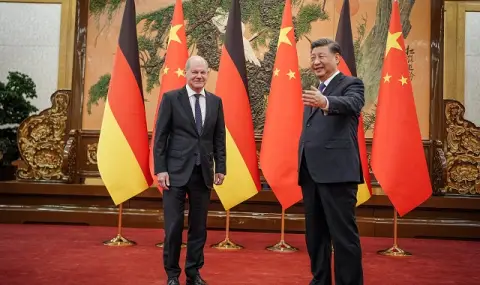China's espionage becomes more and more aggressive and unceremonious. The detention of three people accused of spying for China raises the question of the extent to which Germany has been infiltrated by Beijing's secret services.
Three people were detained in Germany on charges of spying for China. This raises the question of how successful China's secret services are. The alleged Chinese spies in Germany were exposed immediately after Chancellor Olaf Scholz's visit to China, during which the protection of industrial secrets of German companies was discussed. In March, China's Congress of People's Deputies passed new laws requiring foreign companies to disclose even certain sensitive information. These coercive measures fall in line with China's industrial espionage abroad.
If we turn our attention beyond the borders of Germany, we will immediately find out on what scale the espionage of the People's Republic operates. A study by the Washington-based think tank CSIS shows that since Xi Jinping took power in Beijing in 2012, China's espionage activity has grown significantly. Since Xi came to power, Chinese espionage has now transcended the framework of its purely commercial motivation and mostly serves the strategic political goals of official Beijing. A current report on the subject says that 224 Chinese espionage crimes are known in the US alone.
Every foreigner – a potential spy for the West?
The report also says that Xi used the secret services as a tool to implement his global strategic plans from the beginning – and treats and equips them precisely as such a helper.
Inside China, the secret services, meanwhile, operate quite openly and spread the feeling that any foreigner could be a potential spy for the West.
Journalists from the British public media BBC summarized: “Under Xi Jinping, China's most authoritarian leader in decades, the country's spy service, which has always been shrouded in great secrecy, has dramatically increased its public presence and expanded its sphere of action“. The spy services produce propaganda films that are seen all over the country. This state-instilled paranoia comes from the very top of the system: the Xi ruler, like his partner and friend Vladimir Putin, has completely isolated himself in the years of the pandemic and further radicalized himself.
Unlike the practice of other secret services, which rely on long-established contacts, Beijing relies on informants – for example, to students who are staying abroad only for a certain period of time. The Confucius Institutes, which are disguised as cultural institutions, actually function as espionage units of the Chinese Communist Party. From these institutes there is pressure on young Chinese not to criticize their homeland – they threaten them that otherwise their relatives in China will have trouble.
Growing Chinese promiscuity
These actions by Beijing are well known to the secret services in both the US and Germany – and not since yesterday. Until a few years ago, it seemed that the free world could put up with this kind of espionage, which is not uncommon. But in view of China's growing aggressiveness and brazenness, a number of democratic countries have decided to reduce their dependence on China and limit access to sensitive technologies.
So far, however, Germany remains a sad exception to this trend. After Chancellor Olaf Scholz's visit to China, the authoritative publication “Foreign Policy” finds that the chancellor and his GSDP, in contrast to their coalition partners the SDP and the Greens, seem to adjust the policy towards China entirely to the wishes of German concerns – and not in the interest of the citizens of the country.
Chancellor without geopolitical weight
The magazine supports this finding with the fact that in Scholz's delegation, representatives of the ministries of transport and agriculture had the greatest weight, that is, those who do not speak about the desperate state of human rights in China, but are interested mainly from the commercial interests of both countries.
According to the publication, the chancellor was unable to deliver a clear political message because he did not have his own geopolitical weight, so he had to simply ask for access to the Chinese markets on behalf of the German economy. So, while Xi Jinping manages to skillfully juggle the interests of democratic countries, they cannot and will not be able to take a joint action against Chinese espionage.
